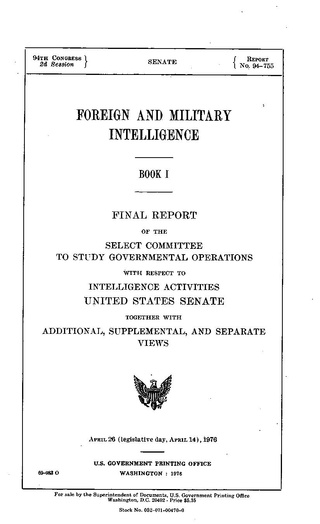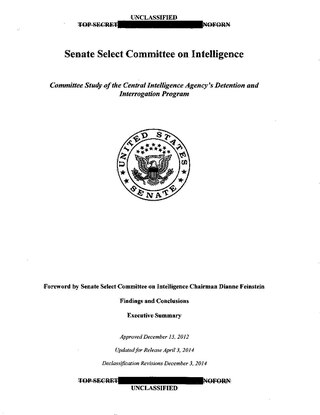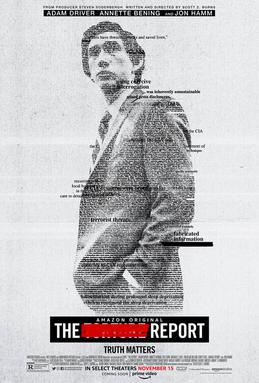Related Research Articles

Daniel Robert Graham is an American lawyer, author, and politician who served as the 38th governor of Florida from 1979 to 1987 and a United States senator from Florida from 1987 to 2005. He is a member of the Democratic Party.

George John Tenet is an American intelligence official and academic who served as the Director of Central Intelligence (DCI) for the United States Central Intelligence Agency, as well as a Distinguished Professor in the Practice of Diplomacy at Georgetown University.

The director of central intelligence (DCI) was the head of the American Central Intelligence Agency from 1946 to 2004, acting as the principal intelligence advisor to the president of the United States and the United States National Security Council, as well as the coordinator of intelligence activities among and between the various US intelligence agencies.

The United States Senate Select Committee on Intelligence is dedicated to overseeing the United States Intelligence Community—the agencies and bureaus of the federal government of the United States that provide information and analysis for leaders of the executive and legislative branches. The Committee was established in 1976 by the 94th Congress.

The Senate Report on Iraqi WMD Intelligence was the report by the United States Senate Select Committee on Intelligence concerning the U.S. intelligence community's assessments of Iraq during the time leading up to the 2003 invasion of Iraq. The report, which was released on July 9, 2004, identified numerous failures in the intelligence-gathering and -analysis process. The report found that these failures led to the creation of inaccurate materials that misled both government policy makers and the American public.

Mustafa Ahmed Adam al-Hawsawi is a Saudi Arabian citizen. He is alleged to have acted as a key financial facilitator for the September 11 attacks in the United States.

The Church Committee was a US Senate select committee in 1975 that investigated abuses by the Central Intelligence Agency (CIA), National Security Agency (NSA), Federal Bureau of Investigation (FBI), and the Internal Revenue Service (IRS). Chaired by Idaho Senator Frank Church (D-ID), the committee was part of a series of investigations into intelligence abuses in 1975, dubbed the "Year of Intelligence", including its House counterpart, the Pike Committee, and the presidential Rockefeller Commission. The committee's efforts led to the establishment of the permanent US Senate Select Committee on Intelligence.
The Saddam–al-Qaeda conspiracy theory was based on false claims made by the United States government, alleging that a highly secretive relationship existed between Iraqi president Saddam Hussein and the Sunni pan-Islamist militant organization al-Qaeda between 1992 and 2003. The George W. Bush administration promoted it as a main rationale for invading Iraq in 2003.

Mohammed Farik Bin Amin, alias Zubair Zaid, is a Malaysian who is alleged to be a senior member of Jemaah Islamiyah and al Qaeda. He is currently in American custody in the Guantanamo Bay detention camp. He is one of the 14 detainees who had previously been held for years at CIA black sites. He is currently awaiting trial in a military commission. In the ODNI biographies of those 14, Amin is described as a direct subordinate of Hambali. Farik Amin is also a cousin of well-known Malaysian terrorist Zulkifli Abdhir.

Porter Johnston Goss is an American politician and government official who served as the head of the Central Intelligence Agency from 2004 to 2006. He was the last Director of Central Intelligence (DCI) from 2004 to 2005, then became the first Director of the Central Intelligence Agency following the passage of the 2004 Intelligence Reform and Terrorism Prevention Act, which abolished the DCI position and replaced it with the Director of National Intelligence on December 17, 2004
Various conspiracy theories allege that certain institutions or individuals had foreknowledge of the September 11 attacks in the United States in 2001. Some of the primary debates include whether the Bush administration or the United States Armed Forces had awareness of the planned attack methods, the precise volume of intelligence that American agencies had regarding al-Qaeda activities inside the United States, whether the put options placed on United Airlines and American Airlines and other trades indicated foreknowledge, and why the identities of the traders have never been made public.
The 9/11 Commission, which investigated the terrorist September 11 attacks on the United States, was subject to a variety of criticisms by politicians, government officers, and private groups and citizens. The commission was created on November 27, 2002 by a bill passed by the U.S. Congress and signed into law by President George W. Bush.

The Office of Inspector General of the United States Central Intelligence Agency (CIA) is the independent overseer of the organisation. Since 2021, the office has been held by Robin Ashton. The first inspector general was appointed in 1952.
The timeline below details the ongoing investigation into the September 11, 2012 attack upon the American diplomatic mission at Benghazi, in Libya. The attack and the investigation are the subject of much controversy in the American political sphere.

The Committee Study of the Central Intelligence Agency's Detention and Interrogation Program is a report compiled by the bipartisan United States Senate Select Committee on Intelligence (SSCI) about the Central Intelligence Agency (CIA)'s Detention and Interrogation Program and its use of torture during interrogation in U.S. government communiqués on detainees in CIA custody. The report covers CIA activities before, during, and after the "War on Terror". The initial report was approved on December 13, 2012, by a vote of 9–6, with seven Democrats, one Independent, and one Republican voting in favor of the report and six Republicans voting in opposition.
Ten investigations were conducted into the 2012 Benghazi attack, six of these by Republican-controlled House committees. Problems were identified with security measures at the Benghazi facilities, due to poor decisions made by employees of the State Department's Bureau of Diplomatic Security, and specifically its director Eric Boswell, who resigned under pressure in December 2012. Despite numerous allegations against Obama administration officials of scandal, cover-up and lying regarding the Benghazi attack and its aftermath, none of the ten investigations found any evidence to support those allegations. The last of the investigation committees issued its final report and shut down in December 2016, one month after the 2016 presidential election.
Since the September 11 attacks in the United States in 2001, allegations of Saudi government involvement in the attacks have been made, with the Kingdom of Saudi Arabia regularly denying such claims.
The 28 pages refers to the final section of the December 2002 report of the Joint Inquiry into Intelligence Community Activities before and after the Terrorist Attacks of September 11, 2001, conducted by the Senate Select Committee on Intelligence and the House Permanent Select Committee on Intelligence. This section is titled "Part IV: Finding, Discussion and Narrative Regarding Certain Sensitive National Security Matters," and summarizes investigative leads describing financial, logistical and other support provided to the hijackers and their associates by Saudi Arabian officials and others suspected of being Saudi agents. It was declassified on July 15, 2016.

Gina Cheri Walker Haspel is an American intelligence officer who was the director of the Central Intelligence Agency (CIA) from May 21, 2018, to January 20, 2021. She was the agency's deputy director from 2017 to 2018 under Mike Pompeo, and became acting director on April 26, 2018, after Pompeo became U.S. secretary of state. She was later nominated and confirmed to the role, making her the first woman to become CIA director on a permanent basis.

The Report is a 2019 American historical political drama film written and directed by Scott Z. Burns that stars Adam Driver, Annette Bening, Ted Levine, Michael C. Hall, Tim Blake Nelson, Corey Stoll, Maura Tierney, and Jon Hamm. The plot follows staffer Daniel Jones and the Senate Intelligence Committee as they investigate the Central Intelligence Agency's use of torture following the September 11th attacks. It covers more than a decade's worth of real-life political intrigue, exploring and compacting Jones's 6,700-page report.
References
- ↑ Patrick Martin (6 March 2002). "Further delay in US congressional investigation into September 11 attacks". World Socialist Web Site. Archived from the original on 30 March 2010. Retrieved 10 August 2010.
- 1 2 Press Release of Intelligence Committee Archived 2014-09-18 at the Wayback Machine , Senate and House Intelligence Committees Announce Joint Inquiry into the September 11th Terrorist Attacks, February 14, 2002.
- 1 2 Greg Miller, Leader of 9/11 Probe Resigns Suddenly Archived 2014-09-05 at the Wayback Machine , Los Angeles Times, April 30, 2002.
- 1 2 3 Athan G. Theoharis, editor, The Central Intelligence Agency: Security Under Scrutiny, Greenwood Publishing Group, p. 222-224 Archived 2016-09-03 at the Wayback Machine , 2006, ISBN 0313332827
- ↑ Richard Leiby, A Cloak But No Dagger; An Ex-Spy Says He Seeks Solutions, Not Scapegoats for 9/11 Archived 2017-05-27 at the Wayback Machine , Washington Post, May 18, 2002.
- ↑ James Risen and David Johnston, Report on 9/11 Suggests a Role By Saudi Spies Archived 2017-02-05 at the Wayback Machine , Washington Post, August 2, 2003.
- ↑ Improving Intelligence Archived 2017-09-23 at the Wayback Machine , PBS interview with Sen. Bob Graham, December 11, 2002.
- ↑ The House Permanent Select Committee on Intelligence and the Senate Select Committee on Intelligence (December 2002). "Report of the Joint Inquiry into the Terrorist Attacks of September 11, 2001" (PDF). Archived (PDF) from the original on May 17, 2017. Retrieved 2017-04-18.
- 1 2 DePetris, Daniel R. (6 May 2016). "The 28 Pages: What's Taking So Long?". The National Interest. Archived from the original on 14 July 2016. Retrieved 7 July 2016.
- ↑ Demirjian, Karoun (15 July 2016). "Congress releases long-classified '28 pages' on alleged Saudi ties to 9/11". Washington Post. Archived from the original on 15 July 2016. Retrieved 15 July 2016.
- ↑ "Investigating Sept. 11". NewsHour. PBS. November 27, 2002. Archived from the original on February 20, 2009. Retrieved January 21, 2009.
- ↑ Bob Graham, with Jeff Nussbaum, Intelligence Matters: The CIA, the FBI, Saudi Arabia, and the Failure of America's War on Terror, Random House], 2004, ISBN 1588364526
- ↑ Interview: Senator Bob Graham, Democrat of Florida, discusses his theory about a Saudi link to 9/11, NPR, September 9, 2004.
- ↑ "28 Pages: Former Sen. Bob Graham and others urge the Obama administration to declassify redacted pages of a report that holds 9/11 secrets". CBS. April 10, 2016. Archived from the original on April 15, 2016. Retrieved April 15, 2016.
- 1 2 Rachael Revesz (April 12, 2016). "Barack Obama urged to declassify report detailing links between 9/11 and Saudi Arabia". The Independent. Archived from the original on September 7, 2017. Retrieved September 2, 2017.
- ↑ "Top secret "28 pages" may hold clues about Saudi support for 9/11 hijackers". CBS News . Archived from the original on 2016-04-12. Retrieved 2016-04-16.
- ↑ "A Saudi Imam, 2 Hijackers and Lingering 9/11 Mystery". Mark Mazzetti and Scott Shane. NYT. June 17, 2016. Archived from the original on June 18, 2016. Retrieved June 18, 2016.
- ↑ "SCHUMER, CORNYN ANNOUNCE 'JUSTICE AGAINST SPONSORS OF TERRORISM ACT' – LEGISLATION, LONG SOUGHT BY 9/11 FAMILIES, WILL ALLOW VICTIMS OF 9/11 & OTHER TERRORIST ACTS TO SUE FOREIGN COUNTRIES & OTHERS THAT FUNDED AL QAEDA, ISIS". September 17, 2015. Archived from the original on April 19, 2016. Retrieved April 20, 2016.
- ↑ Steinhauer, Jennifer (September 28, 2016). "Congress Votes to Override Obama Veto on 9/11 Victims Bill". The New York Times. Archived from the original on October 3, 2016. Retrieved 2016-10-04.